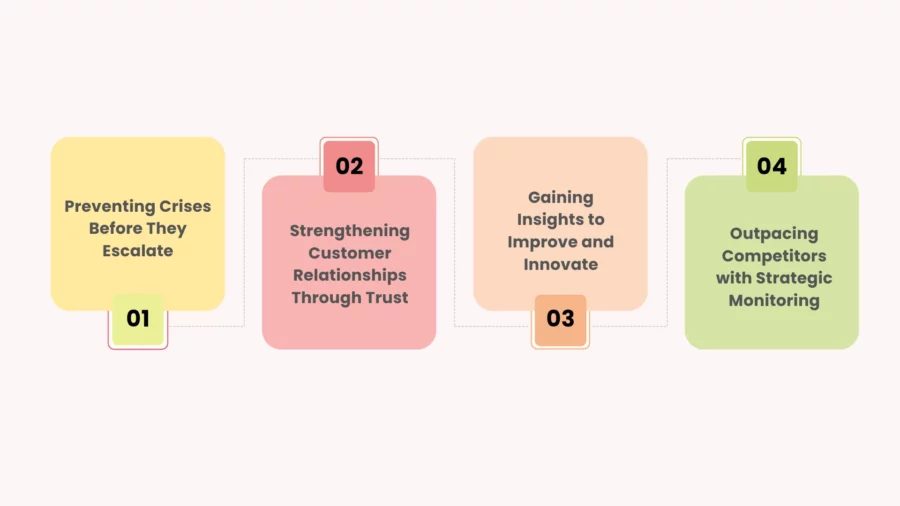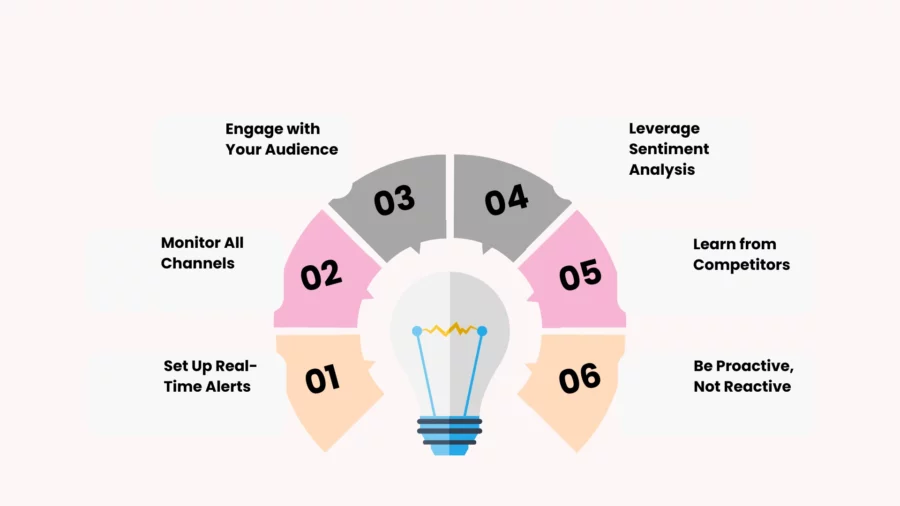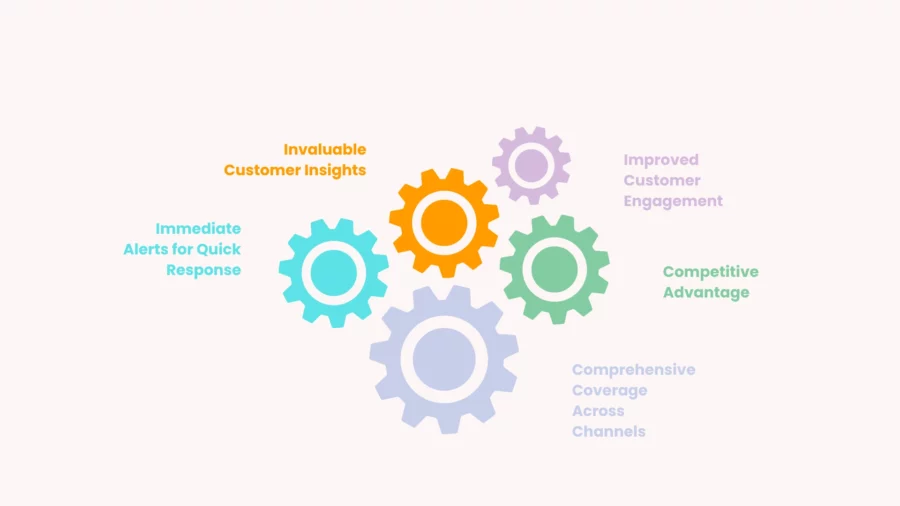Key Takeaways:
- Monitor brand reputation to identify potential issues early and prevent crises from damaging your business.
- Consistently track feedback to address concerns promptly, improving customer satisfaction and fostering long-term loyalty.
- Leverage insights from brand reputation monitoring to adapt strategies, outshine competitors, and maintain a strong market presence.
Your brand’s reputation is everything. One glowing reviews on websites can bring a wave of loyal customers, while a single negative mentions can spiral into a PR nightmare if left unchecked.
People are talking about your brand—on social media platforms, review sites, forums, and even in casual conversations. But the real question is: are you listening?
Brand reputation monitoring isn’t just about damage control; it’s about staying ahead of the game. It’s like having your finger on the pulse of your audience, knowing their sentiments, and acting proactively.
Imagine spotting a dissatisfied customer’s tweet and resolving their issue before it escalates or noticing a trend where people are praising your eco-friendly practices, allowing you to double down on what works.
With the right tools and strategies, you can transform brand reputation monitoring into your secret weapon for building trust, improving customer relationships, and standing out in a crowded marketplace.
It’s not just about what people are saying; it’s about what you do with that information. Ready to take control of your brand’s narrative? Let’s dive into why comprehensive monitoring of your reputation matters and how it can help you stay one step ahead.
Protect Your Brand & Recover Revenue With Bytescare's Brand Protection software
What is Brand Reputation Monitoring?
Brand reputation monitoring is like keeping your ear to the ground in the digital world. It’s the process of tracking what people are saying about your brand—be it through social media posts, online reviews, blog comments, or even news articles. Think of it as the modern-day word of mouth, amplified by the internet.
But it’s more than just listening. It’s about knowing how your brand is perceived and taking action to shape that perception.
In a world where one viral post can either catapult your brand into the spotlight or send it spiraling into damage control, staying aware of your reputation isn’t optional—it’s essential.
Imagine someone leaves a negative review about your product online. If you’re monitoring your brand’s reputation, you can address the issue quickly, showing not just that you care but that you’re committed to improvement.
On the flip side, if customers are raving about a particular feature of your service, you can amplify that positivity, turning happy customers into brand advocates.
Brand reputation monitoring also helps you spot trends, know customer sentiment, and even keep an eye on competitors.
It’s like having a real-time report card for your business, showing what’s working and what needs attention.
Why is Brand Reputation Monitoring Important?

Your brand’s reputation can make or break your business. Customers often rely on online reviews, social media, and public perception before making decisions.
A strong reputation builds trust, while a negative one can drive customers straight to your competitors.
Preventing Crises Before They Escalate
A single bad review or social media post can go viral, damaging your brand’s credibility. Brand reputation monitoring helps you spot potential issues early. By addressing negative feedback promptly and professionally, you can turn a dissatisfied customer into a loyal one and prevent a PR crisis.
Strengthening Customer Relationships Through Trust
Customers appreciate businesses that listen and respond to their concerns.
Monitoring your brand’s reputation allows you to engage with your audience, thank them for positive feedback, and resolve complaints swiftly. This level of attention shows that you care, strengthening customer loyalty and trust.
Gaining Insights to Improve and Innovate
Monitoring isn’t just about spotting problems—it’s about learning. You gain valuable insights to refine your products, services, and strategies by tracking what customers love or dislike about your brand. These insights can guide innovation and help you stay relevant in a competitive market.
Outpacing Competitors with Strategic Monitoring
Reputation monitoring doesn’t just focus on your brand; it also provides insights into your competitors’ actions. Knowing how they’re perceived helps you identify opportunities to differentiate your business and stay ahead in the market.
Protect Your Brand & Recover Revenue With Bytescare's Brand Protection software
Key Components of Brand Reputation Monitoring
| Social Media Monitoring | Keeping track of mentions, comments, and tags on platforms like Instagram, Twitter, and Facebook. |
| Online Review Tracking | Monitoring reviews on sites like Google, Yelp, and Trustpilot. |
| Sentiment Analysis | Knowing the tone of conversations—positive, negative, or neutral. |
| Competitor Monitoring | Tracking what people say about your competitors. |
| Crisis Management Alerts | Setting up alerts for negative spikes in mentions or reviews. |
| Customer Feedback | Collecting direct feedback through surveys, emails, or chatbots. |
| Media Coverage Analysis | Monitoring news articles and blogs mentioning your brand. |
| Influencer Insights | Tracking what influencers say about your brand. |
| Search Engine Results | Regularly checking your brand’s presence on search engines. |
Effective Strategies for Brand Reputation Monitoring

Effective brand reputation monitoring goes beyond just keeping an eye on what people are saying—it’s about taking strategic steps to manage and improve your brand’s image. Here are some key strategies to get it right:
Set Up Real-Time Alerts
Use tools like Google Alerts or social media monitoring platforms to receive notifications whenever your brand is mentioned online. Real-time updates allow you to respond quickly to both positive and negative feedback, ensuring you’re always in the loop.
Monitor All Channels
Don’t limit your monitoring to just social media or review sites. Keep track of blogs, news articles, forums, and even search engine results. A comprehensive approach ensures you don’t miss anything that could impact your reputation.
Engage with Your Audience
Actively respond to customer reviews, comments, and questions. Whether it’s a thank-you for a positive mention or resolving a complaint, engagement shows that your brand cares about its customers.
Leverage Sentiment Analysis
Know the tone of conversations about your brand. Are people happy, upset, or neutral? Sentiment analysis tools can help you identify trends and areas for improvement.
Learn from Competitors
Keep an eye on what’s being said about your competitors. Their successes and failures can provide valuable insights to refine your strategies.
Be Proactive, Not Reactive
Regularly evaluate your brand’s strengths and weaknesses based on feedback. Use this information to make improvements before issues arise, turning monitoring into a tool for growth.
Protect Your Brand & Recover Revenue With Bytescare's Brand Protection software
Top 10 Brand Reputation Monitoring Tools
Monitoring your brand’s reputation is easier and more effective with the right tools. Here’s a list of the top 10 brand reputation monitoring tools that can help you stay on top of what people are saying about your business:
Google Alerts
A free and simple tool to monitor mentions of your brand online. It sends real-time alerts to your email.
A comprehensive social media management platform that allows you to track mentions, schedule posts, and engage with your audience all in one place.
Brand24
This tool provides real-time updates on brand mentions across social media, blogs, forums, and more, with detailed sentiment analysis.
Sprout Social
Sprout Social combines social media monitoring with analytics, helping you track brand mentions and assess your performance.
Mention
Monitor the web, social media, and news for your brand mentions with this powerful tool. It also offers competitor tracking.
BuzzSumo
Ideal for tracking content mentions, this tool helps you discover trending topics and measure the impact of your brand’s online presence.
Reputology
Specially designed for monitoring reviews, Reputology lets you track feedback from major review sites and respond directly.
Talkwalker
A robust tool for tracking brand mentions across multiple channels, including social media, news sites, and TV.
Meltwater
A premium tool that offers deep insights into brand mentions, competitor analysis, and PR performance.
Awario
This tool scans the web and social media for brand mentions, offering actionable insights with sentiment analysis.
What Are the Benefits of Brand Reputation Monitoring Tools?

Immediate Alerts for Quick Response
Brand reputation monitoring tools provide real-time alerts whenever your brand is mentioned online. This allows you to respond swiftly to both positive and negative feedback.
Addressing concerns promptly helps prevent small issues from snowballing into larger problems, protecting your brand’s image.
Invaluable Customer Insights
These tools offer valuable insights into customer sentiment. By tracking how people feel about your brand, you can identify trends, preferences, and areas needing improvement.
This feedback loop helps you make data-driven decisions, enhancing your products, customer services, and customer interactions.
Improved Customer Engagement
With brand monitoring tools, you can actively engage with customers who mention your brand.
Whether it’s thanking someone for a positive review or addressing a complaint, timely responses foster stronger customer relationships and demonstrate that you care about your customer opinions.
Competitive Advantage
Monitoring tools allow you to track your competitors’ reputations as well. By keeping an eye on their strengths and weaknesses, you can adjust your strategies to stay ahead in the market.
It’s a smart way to learn from your competition and capitalise on opportunities they might miss.
Comprehensive Coverage Across Channels
Reputation monitoring tools track your brand across various platforms—social media, news outlets, blogs, and review sites.
This comprehensive coverage ensures that no mention goes unnoticed, allowing you to maintain a consistent brand presence and protect your image across all channels.
Challenges in Brand Reputation Monitoring
Brand reputation monitoring is essential for maintaining a positive image, but it comes with its own set of challenges. Here are some common hurdles businesses face:
Information Overload
With countless mentions across social media, news sites, and review platforms, it can be overwhelming to sift through all the data. Not all mentions are relevant, and sorting through the noise to find valuable insights can be time-consuming and inefficient.
Sentiment Analysis Accuracy
While many tools offer sentiment analysis, accurately gauging the tone of online conversations can be tricky.
Sarcasm, cultural differences, and context can lead to misinterpretation, making it difficult to fully know how customers feel about your brand.
Responding to Negative Feedback
It’s easy to engage with happy customers, but handling negative feedback can be a delicate task. If not addressed properly, unhappy customer reviews or comments can escalate and harm your reputation.
Crafting thoughtful, empathetic responses is key, but it can be challenging to manage at scale.
Dealing with Fake Reviews or Comments
The rise of fake reviews or comments can complicate brand reputation monitoring. Some businesses may face fake negative feedback aimed at tarnishing their reputation. Identifying and addressing these fraudulent mentions can be time-consuming and difficult.
Keeping Up with Competitors
Monitoring your brand is essential, but keeping track of competitors’ reputations adds another layer of complexity. Staying ahead of the competition requires constant vigilance and strategic adjustments, which can stretch resources.
Brand Reputation Monitoring vs. Online Reputation Management
| Brand Reputation Monitoring | Online Reputation Management |
| The process of tracking and analysing mentions of your brand across various online platforms. | The proactive approach of improving and maintaining a positive brand image online. |
| Focuses on gathering data about brand sentiment, feedback, and mentions. | It focuses on actively managing and shaping how the brand is perceived online. |
| To know public perception and detect issues early. | To address issues, resolve complaints, and enhance the brand’s online presence. |
| Monitoring and listening to what is being said about the brand across digital channels. | Taking action, including responding to feedback, improving content, and PR efforts. |
| Uses tools for tracking mentions, sentiment analysis, and alerts. | Involves tools for reputation repair, review management, and content creation. |
| Often reactive—responding to mentions and feedback as they come in. | Proactive—implementing strategies to improve or fix brand perception over time. |
| Broader includes tracking mentions, sentiment, and competitive analysis. | More focused on addressing specific negative feedback and controlling the narrative. |
| Monitoring social channels, reviews, blogs, and news outlets. | Responding to negative reviews, creating positive content, and improving SEO. |
| Requires ongoing monitoring and quick responses. | Requires long-term strategies for building and maintaining a positive reputation. |
What’s Next?
Brand reputation monitoring is a vital tool for any business aiming to stay ahead in today’s digital world.
By tracking online mentions, knowing customer sentiment, and responding quickly to feedback, businesses can protect their image and build trust with their audience.
It’s not just about managing negative comments but also about identifying opportunities to enhance your brand’s strengths.
With the right tools and strategies, reputation monitoring can provide invaluable insights that help shape a more positive public perception.
Whether you’re a small business or a large corporation, staying on top of your brand’s reputation is an ongoing effort that pays off in the long run, fostering stronger relationships and driving growth.
Your brand’s reputation is everything. Bytescare’s Reputation Management services use advanced technology and expert strategies to protect and enhance your positive brand reputation.
From scanning for defamation to removing harmful content, we ensure your brand’s integrity stays strong. Contact us today to safeguard your reputation.
The Most Widely Used Brand Protection Software
Find, track, and remove counterfeit listings and sellers with Bytescare Brand Protection software

FAQs
How do you measure brand reputation?
Brand reputation is measured by analysing customer sentiment, online reviews, social media mentions, and media coverage. Tools like sentiment analysis, surveys, and customer feedback help assess how positively or negatively your brand is perceived by the public.
How do you monitor brand reputation?
Brand reputation is monitored by tracking mentions across social media, review sites, blogs, and news outlets. Using online reputation management tools like Google Alerts, Hootsuite, and Mention, businesses can receive real-time updates and quickly respond to customer feedback or emerging issues.
Why is Brand Reputation Monitoring Important?
Brand reputation monitoring is important because it helps businesses know how they are perceived by customers and the public. It provides insights into customer satisfaction, highlights potential areas of concern, and helps in managing brand image. This is essential for maintaining customer trust, identifying opportunities for improvement, and preventing or mitigating crises that could harm the brand’s reputation.
How Does Brand Reputation Monitoring Work?
Brand reputation monitoring works by using various tools and software to scan and analyse mentions of the brand across the internet. These tools track keywords and phrases related to the brand, analyse sentiment, and compile data on how often and in what context the brand is mentioned. This allows businesses to gather real-time feedback and insights about public perception and respond accordingly.
What is Brand Reputation Monitoring?
Brand reputation monitoring is the process of tracking, analysing, and responding to various mentions and discussions about a brand across different platforms. This includes social media, news sites, blogs, forums, and review sites. The goal is to know public perception of the brand, manage its image, and respond appropriately to feedback, both positive and negative.
What Are the Challenges of Brand Reputation Monitoring?
One of the main challenges is the sheer volume of data and the speed at which information spreads online, making it difficult to track and analyse all brand mentions. Additionally, interpreting the context and sentiment of mentions accurately can be challenging, as it requires sophisticated analysis. There’s also the challenge of responding effectively to negative feedback or crises in a way that minimises damage to the brand.
Can Small Businesses Benefit from Brand Reputation Monitoring?
Absolutely. Brand reputation monitoring is not just for large corporations. Small businesses can greatly benefit from knowing how they are perceived by their customers and the local community. Even with limited resources, small businesses can use simpler tools or focus on key platforms to gain valuable insights, improve customer relationships, and enhance their reputation in the market.
Ready to Secure Your Online Presence?
You are at the right place, contact us to know more.

